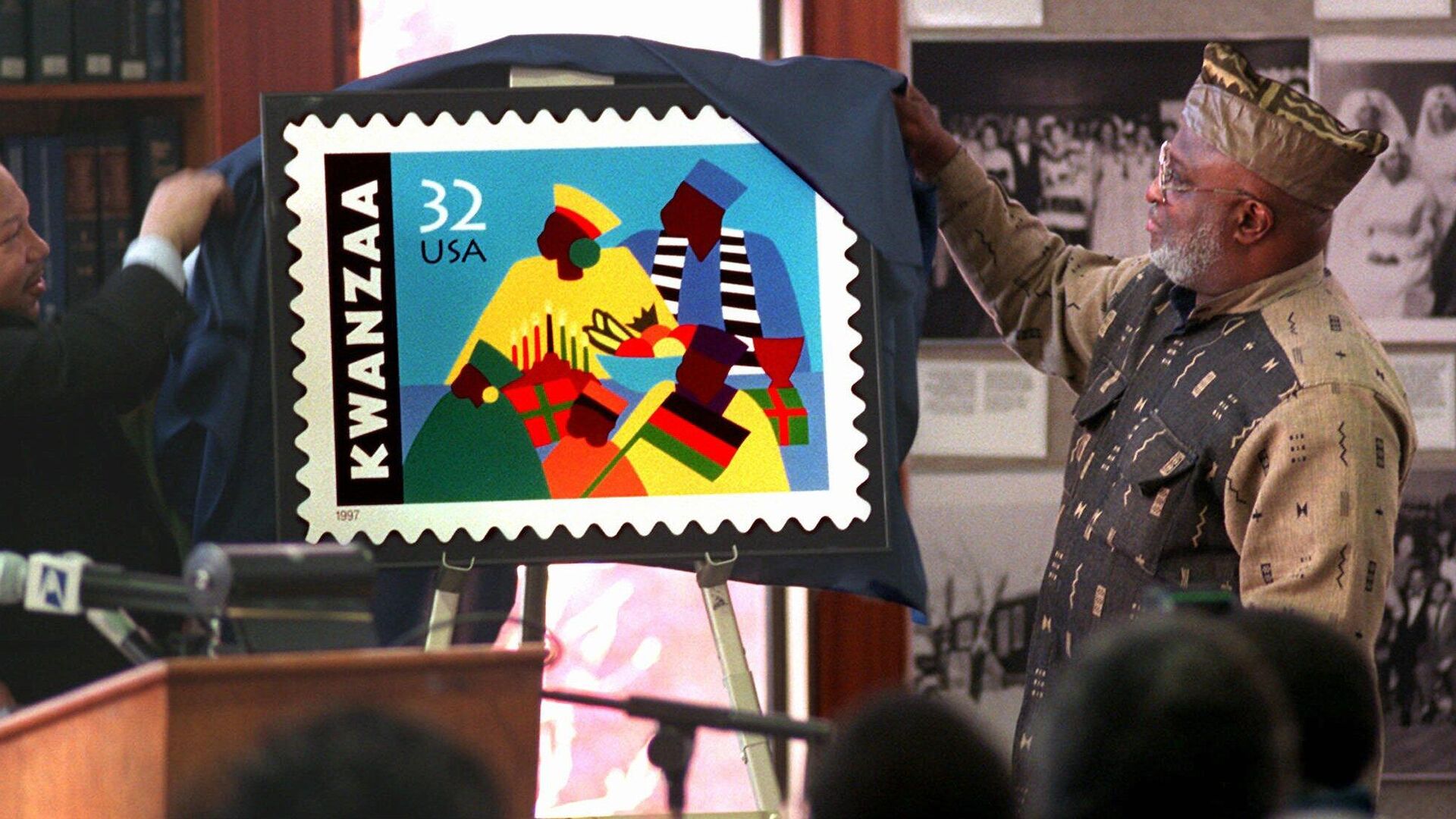https://sputnikglobe.com/20221226/kwanzaa-a-feast-celebrating-african-roots-heritage--culture-1105796497.html
Kwanzaa: A Feast Celebrating African Roots, Heritage & Culture
Kwanzaa: A Feast Celebrating African Roots, Heritage & Culture
Sputnik International
The article is about the seven-day Kwanzaa holiday, which is being celebrated from December 26 till January 1 each year. What is known about the holiday celebrated by about 12 million Americans? Read the story!
2022-12-26T12:01+0000
2022-12-26T12:01+0000
2022-12-26T12:03+0000
africa
us
holiday
caribbean
american
afro-american
https://cdn1.img.sputnikglobe.com/img/07e6/0c/1a/1105796789_6:0:1979:1110_1920x0_80_0_0_a2340548bc17032e596301213700ba47.jpg
African-Americans in the United States and Caribbean celebrate Kwanzaa from December 26 to January 1 as a reminder of their African roots, heritage, history, and human values that abound in their African culture.The name “Kwanzaa” means “first fruits of the harvest” in Swahili. Established in 1966 by African-American human rights activist Maulana Karenga with the aim of enabling black people to enhance their identity, Kwanzaa is now considered by many African-Americans as one of the most important holidays in the Americas during the end-of-year festive season.In 1997, former US President Bill Clinton gave the first presidential declaration marking the Kwanzaa feast. Subsequent Presidents George W. Bush, Barack Obama, Donald Trump, and Joe Biden also issued annual greetings to celebrate Kwanzaa.Although Kwanzaa is primarily an African-American holiday, it has also come to be celebrated outside the borders of the US by millions of Africans in the diaspora around the world, particularly in the Caribbean and some other countries where there are large numbers of descendants of Africans, including the United Kingdom, Jamaica, France, Canada, and Brazil.Celebration of Africanity and human valuesThe Kwanzaa feast focuses on lighting seven green, black and red candles, wearing bright African clothes, and preparing traditional African food, including dishes from various countries in Africa like Ghanaian groundnut stew or South African curry dishes.The celebration also features drumming, dancing and singing traditional African songs, as well as reading poetry about Mother Africa. In addition, telling stories about and remembering the past of the African ancestors are also among the aspects of celebrating Kwanzaa.In terms of meanings and values, the focus in Kwanzaa is on seven principles. A candle is lit every day to reflect one of those seven principles; there are three red candles, three green candles, and a black candle placed in the center of a candleholder known as “kinara”.Also known as the principles of African heritage, the principles all together form the “Kawaida” or “common” philosophy, a mixture of nationalist, pan-Africanist, and socialist values.Each day of Kwanzaa is dedicated to discussing one of the principles, as follows respectively: The end of the Kwanzaa feast marks New Year's Day, and the last candle is lit, Imani.It is noteworthy that despite the fact that the transatlantic slave trade activity did not reach East African nations, the Swahili language (the language of the coasts of East Africa) was used in naming the Kwanzaa principles to indicate that the Kwanzaa feast includes the celebration of all Africa.
africa
caribbean
Sputnik International
feedback@sputniknews.com
+74956456601
MIA „Rossiya Segodnya“
2022
Muhammad Nooh Osman
https://cdn1.img.sputnikglobe.com/img/07e4/08/0e/1080170965_2:0:2050:2048_100x100_80_0_0_1de8233c87df0979e7e74f61b6ffacad.jpg
Muhammad Nooh Osman
https://cdn1.img.sputnikglobe.com/img/07e4/08/0e/1080170965_2:0:2050:2048_100x100_80_0_0_1de8233c87df0979e7e74f61b6ffacad.jpg
News
en_EN
Sputnik International
feedback@sputniknews.com
+74956456601
MIA „Rossiya Segodnya“
Sputnik International
feedback@sputniknews.com
+74956456601
MIA „Rossiya Segodnya“
Muhammad Nooh Osman
https://cdn1.img.sputnikglobe.com/img/07e4/08/0e/1080170965_2:0:2050:2048_100x100_80_0_0_1de8233c87df0979e7e74f61b6ffacad.jpg
what is kwanzaa, how is kwanzaa celebrated, who celebrates kwanzaa, what are kwanzaa's principles
what is kwanzaa, how is kwanzaa celebrated, who celebrates kwanzaa, what are kwanzaa's principles
Kwanzaa: A Feast Celebrating African Roots, Heritage & Culture
12:01 GMT 26.12.2022 (Updated: 12:03 GMT 26.12.2022) Muhammad Nooh Osman
Writer/Editor
On December 26 each year, some African-Americans begin to put new lights up and decorate their homes in celebration of the seven-day Kwanzaa holiday, one day after the world celebrates Christmas. What is known about the holiday created 56 years ago and celebrated by about 12 million Americans?
African-Americans in the United States and Caribbean celebrate Kwanzaa from December 26 to January 1 as a reminder of their African roots, heritage, history, and human values that abound in their African culture.
The name “Kwanzaa” means “first fruits of the harvest” in Swahili. Established in 1966 by African-American human rights activist Maulana Karenga with the aim of enabling black people to enhance their identity, Kwanzaa
is now considered by many African-Americans as one of the most important holidays in the Americas during the end-of-year festive season.
In 1997, former US President Bill Clinton gave the first presidential declaration marking the Kwanzaa feast. Subsequent Presidents George W. Bush, Barack Obama, Donald Trump, and Joe Biden also issued annual greetings to
celebrate Kwanzaa.
Although Kwanzaa is primarily an African-American holiday, it has also come to be celebrated outside the borders of the US by millions of Africans in the diaspora around the world, particularly in the Caribbean and some other countries where there are large numbers of descendants of Africans, including the United Kingdom, Jamaica, France, Canada, and Brazil.
Celebration of Africanity and human values
The Kwanzaa feast focuses on lighting seven green, black and red candles, wearing bright African clothes, and preparing traditional African food, including dishes from various countries in Africa like Ghanaian groundnut stew or South African curry dishes.
The celebration also features drumming, dancing and singing traditional African songs, as well as reading poetry about Mother Africa. In addition, telling stories about and remembering the past of the African ancestors are also among the aspects of celebrating Kwanzaa.
In terms of meanings and values, the focus in Kwanzaa is on seven principles. A candle is lit every day to reflect one of those seven principles; there are three red candles, three green candles, and a black candle placed in the center of a candleholder known as “kinara”.
Also known as the principles of African heritage, the principles all together form the “Kawaida” or “common” philosophy, a mixture of nationalist, pan-Africanist, and socialist values.
Each day of Kwanzaa is dedicated to discussing one of the principles, as follows respectively:
“Kujichagulia” or self-determination;
“Ujima” or collective work and responsibility;
“Ujamaa” or cooperative economics;
“Nia” or maintaining a purpose;
The end of the Kwanzaa feast marks New Year's Day, and the last candle is lit, Imani.
It is noteworthy that despite the fact that the transatlantic slave trade activity did not reach East African nations, the Swahili language (the language of the coasts of East Africa) was used in naming the Kwanzaa principles to indicate that the Kwanzaa feast includes the celebration of all Africa.



